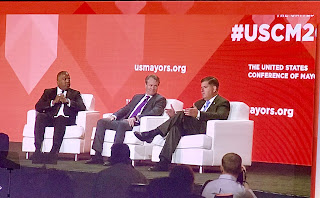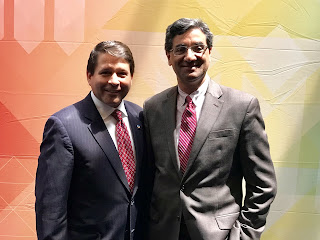Working On The Vine
Friday, August 15, 2025
NY Times Feature on Longevity Fitness
Sunday, June 29, 2025
Health and Wealth Roundtable - June 2025
Building the Foundations of Health and Wealth
One June 26, we gathered a remarkable group of leaders in our TIAA offices in New York City to explore a critical question at the exact mid-point of the Decade of Healthy Aging: Is it correct to assume health and wealth are two sides of the same coin. And if yes, what does it take to build systems that support health and wealth across the full arc of a longer life?
The roundtable brought together voices from healthcare delivery, academia, financial services, philanthropy, and policy. In the room, we had economists, clinicians, innovators, and advocates, all committed to rethinking how we prepare individuals, families, and communities for longevity.
Throughout the day, we returned again and again to the reality that people are living longer than ever. That gift of time also brings new risks and challenges: health shocks, cognitive decline, caregiving strain, and the financial uncertainty of outliving one’s resources. Participants spoke with honesty about how unprepared many systems remain for these realities.
Several themes emerged in the discussion. One was the need for what we have been calling longevity literacy, the understanding not only of how long we might live, but how to plan for health, caregiving, and finances over decades. We heard again and again that this kind of literacy is a public good and that it cannot be achieved by isolated efforts. It requires collaboration among employers, healthcare systems, financial institutions, and communities of trust.
Another clear takeaway was the importance of confronting structural drivers of inequality. As one participant reminded us, income itself is among the most powerful predictors of life expectancy. Health and wealth are not parallel tracks but deeply intertwined.
We also heard powerful calls to design solutions that meet people where they are; embedding financial counseling into clinics, integrating caregiving benefits into workplaces, and creating universal milestones like a “longevity check-up” at age fifty.
Throughout the day, the conversation never drifted into the abstract. It stayed anchored in the real experiences of people like Leon, an Uber driver I met recently who assumes he will die at seventy-five and plans accordingly. His story was a reminder that the systems we design must start with human belief and perception as much as actuarial tables.
By the end of the session, there was a sense of collective momentum. Participants shared a conviction that we have an opportunity, perhaps an obligation to move from insight to action. Whether through pilots, policy experiments, or new collaborations, the ideas generated at the roundtable deserve to be carried forward.
I was delighted that everyone we invited took the time to be part of this dialogue. Their wisdom and generosity of spirit were evident in every exchange.
We will repeat this as a symposium annually until 2029. In 2030 we will reconvene this roundtable to measure our progress and our success!
Wednesday, July 29, 2020
Friday, June 14, 2019
Japan G20
Deputy PM Taro Aso and Queen Maxima of Netherlands spoke along with the Heads of World Bank, Bank of Japan, OECD and WHO. Leading academics from Harvard, Wharton and London Business School spoke as well.
Some pictures from the conference:
 |
| Deputy PM Taro Aso |
 |
| With Dr. Kiyoshi Kurakawa |
 |
| Prof. Olivia Mitchell, Wharton Business School |
 |
| Yours truly |
 |
| OECD Sec. Gen. Angel Gurria |
 |
| Conference Backdrop at the New Otani, Tokyo |
Monday, April 15, 2019
CBS Interview on Early Adulthood Study
Monday, June 11, 2018
Mayors Annual Meeting 2018 Boston
Issues covered included the environment, public private partnerships, smart cities, cyber security, infrastructure, traffic including bikes and autonomous cars, immigration, opioids, inclusive employment, education, pharma, gun violence, poverty, affordable housing, homelessness, water quality and energy.
 |
| Mayoral Shark Tank |
We had a conversation with the mayors Benjamin of Columbia SC and Walsh of Boston on Public Private Partnerships in cities.
 |
| Our conversation on Public Private Partnerships |
 |
| Mayor of Dallas and NFL player Emmitt Smith on promoting entrepreneurship |
My childhood friend Dave Mayer, who is mayor of Gloucester township won an award for most innovative program to deal with the opioid crisis.
 |
| Mayor Dave Mayer |
The conference was an excellent opportunity to see how our enterprise engages with civic leadership. And a chance to see our issues framed in the overall context of civic priorities.






















